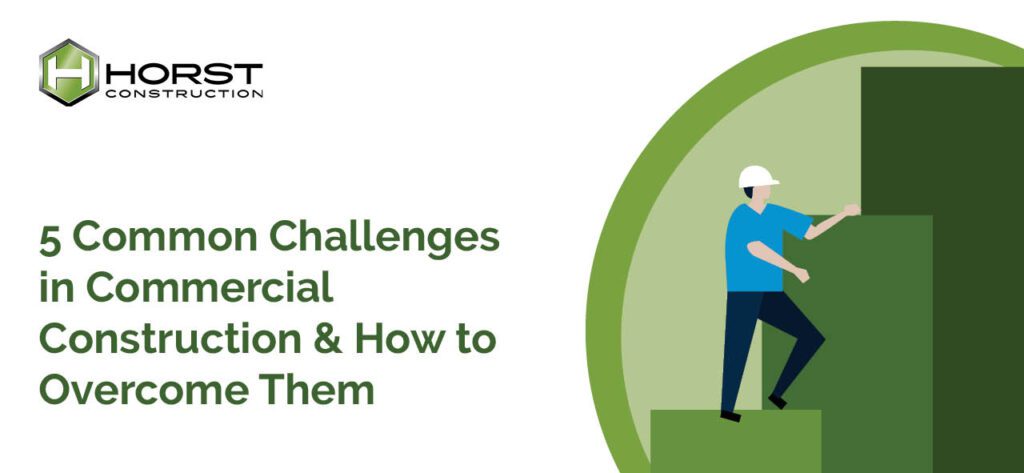Common Challenges in Commercial Construction & How to Overcome Them

Regardless of your construction team’s expertise, unforeseen issues and challenges may arise. What separates the good from the great lies in managing and working through these challenges. A team navigating the complexities of commercial and non-residential construction projects must plan thoroughly, collaborate consistently, and adapt to changing situations.
While every project has unique obstacles, they typically boil down to a few common construction challenges. In this blog, we’ll dissect each hurdle and delve into how we plan for and overcome them.
1. Budget Overruns
Unforeseen expenses and changes in scope can put pressure on a project’s bottom line. A team that acknowledges construction projects’ propensity for creeping budgets can work to limit the impact. The key to staying on budget lies partially in the work done before breaking ground.
One method is to create a thoroughly detailed estimate and scope of work. The more realistic and accurate these documents are, the less likely additional costs pop up as the project progresses. Learn more about how to create a detailed project scope here.
As the team continues to put work in place, budget-control efforts must also continue. At Horst Construction, we continuously monitor costs so we can proactively employ solutions. Most importantly, our open-book policy means you’ll always have access to your project’s financial details.
2. Tight Timelines
Delays are another inherent risk in construction. They stem from factors that are often beyond control, like weather and unforeseen site conditions. The best approach to deal with these challenges promptly is to plan realistically and proceed proactively.
For example, your project schedule should consider typical weather conditions for the area. In the Mid-Atlantic, where much of Horst Construction’s work takes place, there will likely be a handful of winter days where snow and ice make working impossible. There could also be time lost to rain. Only Mother Nature knows the exact amount of work-halting weather events, but assuming every day of a months-long project will be sunny is a mistake. We’ll work around these delays and do whatever we can to stay as productive as possible while still being safe.
Another factor that could stress timelines is material delays. From pandemics to geopolitical issues, global events can disrupt our international supply chain and material availability. Projects stand the best chance of overcoming these challenges through proactive supply chain management. From identifying long-lead and back-ordered items as early in the project process as possible to diversifying suppliers and managing buffer stock, there are things a project team can do to smooth over this challenge in some instances.
Once challenges arise, it’s your construction team’s job to mitigate them in a way that minimizes impact on the schedule. This includes establishing clear and regular communication to quickly address issues and fostering a creative work environment.
Additionally, our team holds regular meetings during which they analyze the work completed to date against the schedule. They’ll also look ahead to work that is planned for upcoming weeks to ensure the proper manpower and materials are in place to accomplish this.
3. Quality Control
We understand how frustrating it can be to spend good money on something only to feel like what was expected isn’t what was delivered. Quality is a core tenet of a successful construction project. Good craftsmanship looks, performs, and ages better.
That said, maintaining consistent construction quality throughout a project takes concerted effort. To ensure our clients are getting the level of quality deserve, we implement a quality control plan.
This plan starts from the beginning with subcontractor selection. After 130+ years of construction work, we have intimate knowledge about the area’s subcontractors. We’ll only bring on teams we know can get the job done right, and our commitment to quality doesn’t stop there. Regular inspections help ensure work is progressing as expected. If there are any issues, they can be rectified promptly. This helps prevent them from snowballing into a larger issue.
4. Safety Concerns
Maintaining a safe work environment is a crucial factor in the construction industry, but it takes expertise and effort. There are certain standards nearly all construction sites will follow, like wearing PPE, maintaining a tidy job site, and using tools properly. However, there may be other safety regulations that are specific to your project.
These can range from renovations compliant with ISO-certified clean room spaces to background clearances for working in occupied buildings and so many more. A project-specific approach to safety will help ensure the workers and anyone else on or near the site stay safe throughout the project.
Enforcement, regular training sessions, and regular safety audits can all help maintain a safe job site and reduce the likelihood of accidents and injuries. At Horst Construction, our full-time safety officer ensures our jobs meet or exceed safety standards for every job site.
5. Communication Hurdles
The solution to many of the challenges listed previously in this blog can, at least in part, be solved by excelling in one thing: communication. Effective communication is oftentimes the lifeblood of a project. Should it break down, misunderstandings and mistakes can create lasting issues that strain the project. But if done correctly, your team stands a better chance at besting the inevitable challenges that pop up as the project progresses.
What does effective communication look like? It can start with a clear communication plan. This plan outlines channels, information flow, and the schedule for regular meetings to address the various aspects and metrics of the projects among relevant stakeholders. Our team uses project management tools that help streamline the flow of information. They’re also committed to cultivating an open and transparent environment by empowering team members to express their insights and concerns freely.
Overcoming Challenges
From clear communication to taking proactive action, a good project team is your best defense against commercial construction project challenges. Clear scopes and detailed estimates followed by active and continued budget monitoring help keep costs in check. Planning for expected disruptions, staying adaptable, and keeping tabs on progress will keep work in line with the schedule.
Good subcontractor partnerships and regular inspections ensure workmanship meets the quality requirements. A project-specific approach to risk can create and maintain a safe work environment for all. Lastly, intentional, regular, and effective communication can make it easy to prevent and address challenges quickly as they arise.
While no construction team can know what unforeseeable challenges lie in store, experienced teams with the right project approach position themselves to deal with them in the best way possible. With over 130 years of experience, Horst Construction has the knowledge and talent needed to prevent or rectify your project’s challenges.
Posted November 17, 2023

